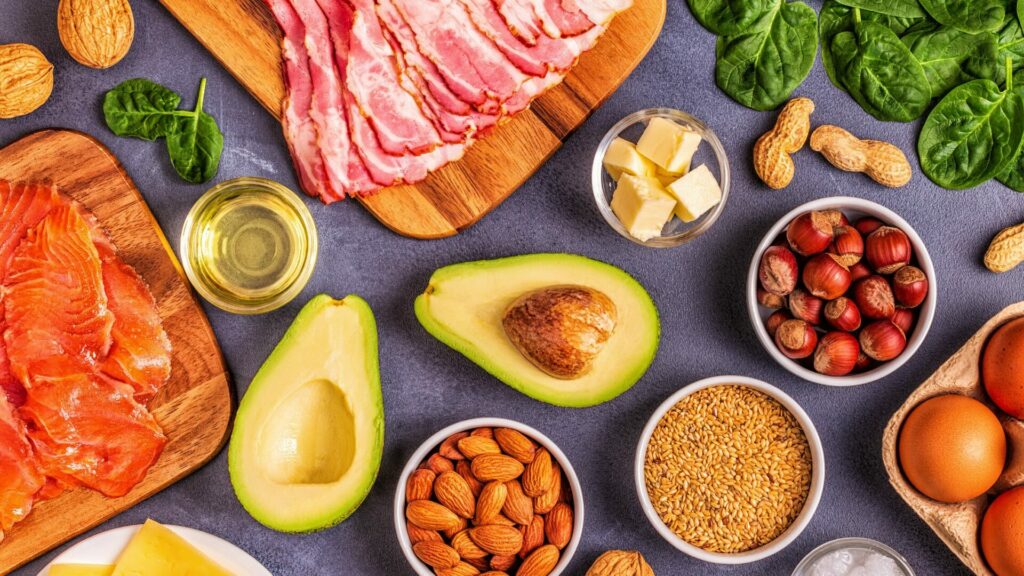Diabetes, a chronic condition, impacts numerous individuals worldwide. Presently, over 400 million individuals worldwide are living with diabetes. While diabetes is complex, managing blood sugar levels effectively can significantly lower the risk of complications. One method to improve blood sugar levels is by adhering to a low-carb diet. This article offers an in-depth look at very low-carb diets for diabetes management.

Table of Contents
How does food influence diabetes?
In diabetes, the body struggles to process carbohydrates efficiently.
Typically, when you consume carbohydrates, they break down into glucose molecules, which eventually become blood sugar.
When blood sugar rises, the pancreas releases insulin, enabling sugar to enter cells.
In individuals without diabetes, blood sugar levels stay steady throughout the day. But for those with diabetes, this system functions differently.
This poses a significant issue as both excessively high and excessively low blood sugar levels can lead to severe harm.
There are various types of diabetes, with the most common being type 1 and type 2. Both can develop at any age.
In type 1 diabetes, the body’s immune system attacks and destroys the insulin-producing beta cells in the pancreas. Individuals with this condition need to take insulin multiple times daily to regulate glucose levels in the bloodstream and keep them within a healthy range.
In type 2 diabetes, beta cells initially produce sufficient insulin, but the body’s cells become resistant to its effects, leading to high blood sugar levels. Consequently, the pancreas increases insulin production in an effort to lower blood sugar.
Over time, beta cells lose their capacity to produce sufficient insulin.
Among the three macronutrients – protein, carbohydrates, and fat – carbohydrates exert the most significant influence on blood sugar regulation as they are broken down into glucose by the body.
Hence, individuals with diabetes might require higher doses of insulin, medication, or both when consuming high-carbohydrate meals.
Do extremely low-carb diets aid in managing diabetes?
Numerous studies endorse low-carb diets for managing diabetes.
Prior to the discovery of insulin in 1921, extremely low-carb diets were commonly prescribed as the standard treatment for individuals with diabetes.
Additionally, low-carb diets appear effective over the long term for those who maintain adherence to them.
In a study, individuals with type 2 diabetes maintained good diabetes management over three years by adhering to a low-carb diet they followed for six months.
Likewise, individuals with type 1 diabetes who adhered to a carb-restricted diet experienced notable enhancements in blood sugar levels over a span of four years.
What is the ideal carbohydrate intake for individuals with diabetes?
The optimal carbohydrate intake for individuals with diabetes is a debated issue, even among proponents of carb restriction.
Numerous studies have shown significant enhancements in blood sugar levels, body weight, and other indicators with a daily carb restriction of 20 grams.
Dr. Richard K. Bernstein, a type 1 diabetic, consumes only 30 grams of carbs daily, demonstrating effective blood sugar control among patients who adopt this approach.
Yet, additional studies indicate that a moderate carb restriction, around 70–90 grams of total carbs or 20% of calories from carbs, is equally effective.
The ideal carb intake can differ for each person due to their unique response to carbs.
As per the American Diabetes Association (ADA), there isn’t a universal diet for all diabetes patients. It’s recommended to have personalized meal plans tailored to individual dietary preferences and metabolic objectives.
The ADA suggests consulting with your healthcare team to determine the appropriate carb intake for you.
To determine your optimal carb intake, consider checking your blood glucose levels before a meal and then again 1 to 2 hours after eating using a meter.
As long as your blood sugar stays under 140 mg/dL (8 mmol/L), a low-carb diet allows for 6, 10, or 25 grams of carbs per meal without risking nerve damage.
It varies based on your individual tolerance. Keep in mind, fewer carbs typically lead to lower blood sugar spikes.
Instead of cutting out all carbs, a balanced low-carb diet should incorporate nutritious, high-fiber sources such as vegetables, berries, nuts, and seeds.
What types of carbohydrates increase blood sugar levels?
In plant-based foods, carbohydrates consist of starch, sugar, and fiber. Only the starch and sugar parts contribute to raising blood sugar levels.
The fiber naturally present in foods, whether soluble or insoluble, doesn’t convert into glucose in the body and doesn’t elevate blood sugar levels.
You can subtract the fiber and sugar alcohols from the total carb count to find the digestible, or “net,” carb content. For instance, 1 cup of cauliflower has 5 grams of carbs, with 3 grams being fiber, making its net carb content 2 grams.
Prebiotic fiber, like inulin, has been demonstrated to enhance fasting blood sugar and other health indicators in individuals with type 2 diabetes.
Sugar alcohols like maltitol, xylitol, erythritol, and sorbitol are commonly used to sweeten sugar-free candies and other “diet” items.
Certain sugar substitutes, such as maltitol, might increase blood sugar levels, particularly in individuals with diabetes.
Be cautious when using the net carb tool, as subtracting all carbs contributed by maltitol from the total may lead to inaccurate counts listed on product labels.
Moreover, neither the Food and Drug Administration (FDA) nor the ADA utilizes the net carb tool.
This carb counter could be a useful tool, offering information on total carbs, net carbs, fiber, protein, and fat for hundreds of foods.
Which foods should you include in your diet and which ones should you steer clear of?
Focusing on consuming nutrient-rich, low-carb whole foods is ideal.
It’s crucial to listen to your body’s hunger and fullness signals, no matter what you’re consuming.
Recommended foods.
Feel free to indulge in these low-carb foods until you’re satisfied, and make sure to include ample protein in every meal.
- Eggs, meat, poultry, and seafood
- Cheese
- Avocados, olives
- Olive oil, coconut oil, butter, cream, sour cream, and cream cheese
- Nonstarchy vegetables (most vegetables except those listed below)
Moderate your intake of these foods.
You can consume the following foods in smaller portions during meals, based on your individual carb tolerance:
- Plain, Greek yogurt: 1 cup or less
- Cottage cheese: 1/2 cup or less
- Nuts and peanuts: 1–2 ounces, or 30–60 grams
- Flaxseeds or chia seeds: 2 tablespoons
- Dark chocolate (at least 85% cocoa): 30 grams or less
- Winter squash (butternut, acorn, pumpkin, spaghetti, and hubbard): 1 cup or less
- Berries: 1 cup or less
- Liquor: 1.5 ounces, or 50 grams
- Dry red or white wine: 4 ounces, or 120 grams
Include legumes like peas, lentils, and beans in your daily carb count as they are healthy protein sources, despite containing carbs.
Significantly cutting carbs typically reduces insulin levels, prompting the kidneys to expel sodium and water.
Consider consuming a cup of broth, a handful of olives, or other low-carb salty foods to replenish lost sodium. Feel free to sprinkle a bit more salt on your meals without hesitation.
If you have congestive heart failure, kidney disease, or high blood pressure, consult your doctor before adding more sodium to your diet.
Avoid these foods.
These foods have high carbohydrate content and can notably elevate blood sugar levels in individuals with diabetes
- Starchy vegetables such as potatoes, sweet potatoes, yams, and taro
- Bread, pasta, cereal, corn, and other grains
- Milk
- Fruit other than berries
- Juice, soda, punch, sweetened tea, etc.
- Beer
- Desserts, baked goods, candy, ice cream, etc.
The Role of Supplements in Supporting Blood Sugar Control
Supplements play a crucial role in the management of diabetes by providing essential nutrients that may be lacking in a diabetic person’s diet.
While maintaining a balanced diet is fundamental for diabetes management, certain vitamins and minerals can support overall health and help regulate blood sugar levels.
For instance, supplements like magnesium, chromium, and vitamin D have been shown to improve insulin sensitivity and reduce the risk of complications associated with diabetes.
Additionally, omega-3 fatty acids found in fish oil supplements can aid in lowering triglyceride levels and reducing inflammation, which are common concerns for individuals with diabetes.
However, it’s important for individuals with diabetes to consult with their healthcare provider before incorporating supplements into their regimen, as some supplements may interact with diabetes medications or have adverse effects if not taken appropriately.
Overall, when used wisely under the guidance of a healthcare professional, supplements can be a valuable adjunct to lifestyle changes and medication in the effective management of diabetes.
Consult with your doctor before making any dietary changes.
Restricting carbs often leads to a significant drop in blood sugar levels.
Due to this, your doctor may frequently decrease your insulin and other medication doses, possibly eliminating them altogether in some instances.
In a study, 17 out of 21 participants with type 2 diabetes were able to either stop or decrease their diabetes medication by limiting carbs to 20 grams per day.
In a separate study, individuals with type 1 diabetes ate fewer than 90 grams of carbohydrates daily. This led to improved blood glucose levels and reduced risk of low blood sugar due to significantly lowered insulin doses.
Without adjusting insulin and other medications for a low-carb diet, there’s a significant risk of experiencing dangerously low blood glucose levels, known as hypoglycemia.
Hence, individuals using insulin or other diabetes medications should consult their doctor before beginning a low-carb diet.
Alternative methods for reducing blood sugar levels
Aside from adhering to a low-carb diet, how does physical activity assist in managing diabetes by enhancing insulin sensitivity?
A mix of resistance training and aerobic exercise provides significant benefits.
Good sleep is vital. Studies consistently link poor sleep to a higher risk of developing diabetes.
A recent study showed that individuals with diabetes who slept between 6.5 to 7.5 hours per night managed their blood glucose better than those who slept less or more.
Another essential aspect of effective blood sugar management involves controlling stress levels. Engaging in activities such as yoga, qigong, and meditation has been demonstrated to reduce both blood sugar and insulin levels.
Conclusion
Research indicates that low-carb diets can effectively control both type 1 and type 2 diabetes, leading to better blood sugar control, decreased reliance on medication, and lowered risk of complications.
However, it’s essential to consult your doctor before altering your diet, as medication doses may require adjustments.






